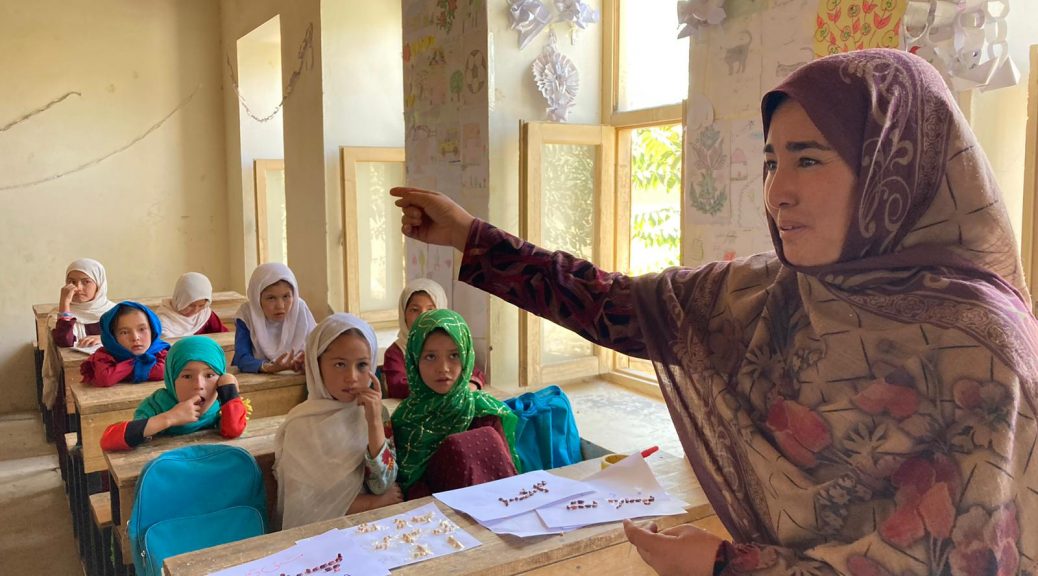More than 200 teachers trained on the prevention of violence against children
Since 2017 Nai Qala has been running a pre-school program. Originally with 3 classes, the program currently targets 90 classes for nearly 2,000 children in 3 provinces. Nai Qala trains the teachers, pays their salaries and equips the classrooms with the right equipment to accommodate and teach the children. The association ensures a regular follow-up of the classes and evaluates the project throughout the school year. The program is having a clear impact: thanks to the academic and social skills they acquire, the children are ready to start primary school, and their parents are more inclined to send them to school.
Over the last 5 years, many improvements have been made to the project. During their induction training and refresher seminars, pre-school teachers acquire skills in health, nutrition and hygiene and improve their teaching skills. Raising parents’ awareness of these issues is an integral part of the teachers’ job description.
Primary school teachers are not ready
Working closely with pre-school teachers and local communities has highlighted behaviors that are detrimental to children’s well-being and prompted Nai Qala to emphasize children’s rights in teacher training. The implementation of the project has improved the understanding of children’s rights and their protection within the communities. However, the evaluation of the pre-school program revealed a significant shortcoming when the young beneficiaries start primary school and are confronted with inappropriate behavior from their teacher.
In Afghanistan, beating and other forms of aggression are often considered normal practice for disciplining and educating children. Unfortunately, teachers are unaware of the harmful effects of such violence on children’s abilities and future well-being, and of other methods of maintaining discipline and encouraging pupils to study. The belief that “good manners cannot be learned without blows” is well established.For victims of violence, school can become a trial rather than an opportunity. The promise and potential of education and the excitement of discovery and learning are undermined by pain, trauma and fear. The experience of violence at school is a cause of school drop-outs.
Raising awareness and building the capacity of teachers
To address the shortcomings of the teaching profession, Nai Qala has set up a violence prevention program. The association invited primary school teachers and the heads of the primary schools to which the pre-school classes are attached. More than 130 teachers from around sixty primary schools in the provinces of Bamyan, Daikundi and Ghazni took part in a week’s training alongside 90 teachers from Nai Qala’s pre-school classes.
The program included a refresher course on child development and needs, psychology, an introduction to positive classroom management, pedagogy and the implementation of strategies to prevent violence in schools. The pre-school teachers were active participants, inspiring the primary school teachers and sharing their experiences.
The violence prevention program runs throughout the school year and includes several training modules and on-site monitoring by trained staff. Each primary school has put in place an action plan. After just a few weeks, concrete changes are taking place. Most schools have already raised awareness of the issue among teachers who were not present at the training session. Some headteachers worked together to set up a timetable linked to learning objectives, a gap and source of stress for teachers. Other schools invited parents to an information session. Some teachers drew up a charter of good conduct with their pupils. On a more personal level, many participants questioned their behavior as teachers… and also as parents.Following on from the program that has already been in place for several years, the teachers in the pre-school classes run by Nai Qala are applying positive pedagogy in the classroom and encouraging parents to behave in a caring manner.
Breaking the patterns of violence
Schools are uniquely placed to provide quality education and to offer children the opportunity to cultivate their creative and critical talents, to acquire practical skills, to develop their self-esteem and social relationships, and to grow in dignity as individuals. Schools can also serve as important resources for the development and speading of the values of non-violence, cooperation, tolerance, and respect, not only among pupils and teaching staff but also beyond, into families and the wider community.
Education has a unique potential to create an environment where attitudes that tolerate violence can be changed and where non-violent behavior can be learned. From an early age, schools and teachers are well placed to break patterns of violence and provide skills in communication, negotiation, and support for peaceful solutions to conflict. Teachers are respected actors within communities and are empowered to pass on the message to parents and the wider community.

